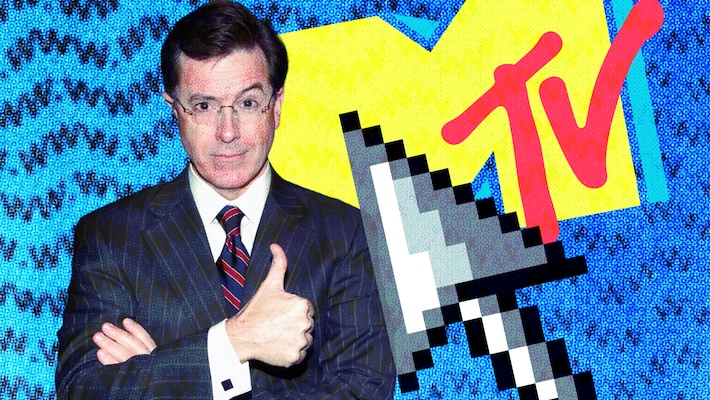
You know that Fresh Prince Of Bel-Air meme of Will Smith standing in an empty room? That’s what Paramount’s web presence looks like right now.
A few days ago, people noticed that Paramount-owned MTVNews.com is no more, meaning over 20 years of original news stories, interviews, and features were essentially wiped from the internet. The purge continued yesterday afternoon (June 26), when the websites for Comedy Central, CMT, TV Land, and Paramount Network started redirecting to the Paramount+ streaming platform. Those sites hosted years worth of TV episodes, many of which are now no longer officially accessible.
This loss of news and entertainment history is a bummer, but it’s not surprising. There’s actually already a name for what’s going on here: We’re in the Digital Dark Age.
To be clear, Paramount isn’t the only offender, and this is far from a new problem: The term “digital dark age” was used as far back as 1999, and it refers to the loss of information and resources due to outdated digital file formats, lack of preservation, and other reasons.
Pew Research Center shared some startling data last month. Their analysis found that 38 percent of webpages that existed in 2013 are gone today. Furthermore, 23 percent of online news articles contain at least one broken link.
The MTV News archives were full of original journalistic work that’s an important part of its era. This 2005 interview with Gerard Way as My Chemical Romance was achieving mainstream success? Gone! (“But you put a link!” Yes, more on that in a second.) This 2014 Jay-Z interview about tensions with Nas and Cam’ron? Zapped! This 2003 feature written shortly after the death of Elliott Smith, providing fascinating historical context about how the world reacted to the loss? Bye-bye!
As Michael Irvin might put it, “We’re losing recipes!”
Then there’s the TV side of things. As Consequence notes, the Comedy Central website hosted the entire Colbert Report series and clips from every Daily Show episode since 1999. Welp, not anymore. That content isn’t otherwise available to stream, either: The Colbert Report isn’t streaming anywhere, and only Seasons 28 and 29 of The Daily Show are on Paramount+.
Not directly related to the issue that sparked this conversation, but preservation is a major issue in the video game space, too. If, for example, you want to play Pokémon Platinum today, a used copy of the game will cost over $100 (per PriceCharting data), and then there’s the matter of getting a working Nintendo DS. So, many have turned to piracy for playing retro games. Valve president Gabe Newell has a relevant, oft-cited quote: “Piracy is not a pricing issue. It’s a service issue. The easiest way to stop piracy is not by putting anti-piracy technology to work. It’s by giving those people a service that’s better than what they’re receiving from the pirates.”
I don’t want to bring potentially unwanted attention to certain preservation efforts, but there are active online communities dedicated to the preservation of large amounts of data. Again, I’m not going to point you in the right direction, but (illegal copies of) retro video games can be easily found online. If you look hard enough, you can find a ton of Colbert Report episodes for free. Less secretively, The Internet Archive has long championed preservation of online resources, and that’s how I was able to link to (archived versions of) those MTV News stories above.
These solutions, though, are imperfect and relatively niche. Most people aren’t going past the second page of Google results in a deep-dive search, or check the Internet Archive when they find a dead link. To the average consumer, this information is just gone. It’s ultimately on those with resources to do their part for cultural preservation, even if it costs them a redirect to PAW Patrol: The Mighty Movie.
I won’t pretend to know what it takes to maintain a website network as sizeable as Paramount’s, but surely, it can’t be significantly resource heavy for a company of its scale. (I don’t know if it can, but don’t call me Shirley.) It’s OK, they have an excuse: In a statement, Paramount explained (as The Hollywood Reporter notes), “As part of broader website changes across Paramount, we have introduced more streamlined versions of our sites, driving fans to Paramount+ to watch their favorite shows.”
What they’ve also introduced (or, in acknowledgement of the fact that they’re far from the sole perpetrator here, helped propagate) is a more streamlined version of cultural history, one in which important details have been sanded away, and less glorified but still-valuable information is lost to time.
Complaining is fun, but often pointless. Is there anything we can actually do? On a small scale, yes. The main thing you can start doing today is to use the Internet Archive to back up news stories or any other valuable webpages you can think to preserve. It’s a quick process and an easy way to help yourself and others maintain access to the world’s knowledge.
This is also an opportunity to consider your own personal data. If your phone or laptop died today, how screwed would you be? Would you lose irreplaceable childhood photos, old creative projects, or vital personal information? I personally subscribe to the “3-2-1 Rule“: Maintain three copies of your data (the original and two backups), use at least two different media types for storage (like a hard drive and cloud storage), and keep one copy of the data offsite (again, cloud storage).
Given the variety of forces and interests involved, the Digital Dark Age is probably not a problem that can be fixed. But, there are things we can do to shine a light during these dark times and stop losing recipes.


 30
30